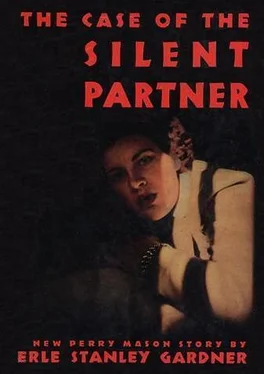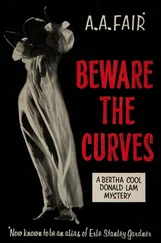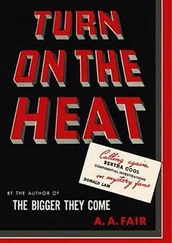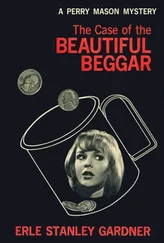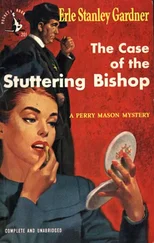Erle Gardner - Case of the Silent Partner
Здесь есть возможность читать онлайн «Erle Gardner - Case of the Silent Partner» весь текст электронной книги совершенно бесплатно (целиком полную версию без сокращений). В некоторых случаях можно слушать аудио, скачать через торрент в формате fb2 и присутствует краткое содержание. Город: New York, Год выпуска: 1940, Издательство: William Morrow, Жанр: Классический детектив, на английском языке. Описание произведения, (предисловие) а так же отзывы посетителей доступны на портале библиотеки ЛибКат.
- Название:Case of the Silent Partner
- Автор:
- Издательство:William Morrow
- Жанр:
- Год:1940
- Город:New York
- ISBN:нет данных
- Рейтинг книги:4 / 5. Голосов: 1
-
Избранное:Добавить в избранное
- Отзывы:
-
Ваша оценка:
- 80
- 1
- 2
- 3
- 4
- 5
Case of the Silent Partner: краткое содержание, описание и аннотация
Предлагаем к чтению аннотацию, описание, краткое содержание или предисловие (зависит от того, что написал сам автор книги «Case of the Silent Partner»). Если вы не нашли необходимую информацию о книге — напишите в комментариях, мы постараемся отыскать её.
Case of the Silent Partner — читать онлайн бесплатно полную книгу (весь текст) целиком
Ниже представлен текст книги, разбитый по страницам. Система сохранения места последней прочитанной страницы, позволяет с удобством читать онлайн бесплатно книгу «Case of the Silent Partner», без необходимости каждый раз заново искать на чём Вы остановились. Поставьте закладку, и сможете в любой момент перейти на страницу, на которой закончили чтение.
Интервал:
Закладка:
“Not so very long.”
“Well?”
“I was strong for Sindler,” she said. “I liked him. He got tired of me, and tried to run another jane in on the business when it looked as though there was going to be some gravy. I didn’t like that.”
“I don’t blame you.”
She said, “You’re certainly asking a lot of personal questions,” finished the coffee, and Mason took the empty cup and set it with the saucer on the table.
“What has Sindler said about me?” she asked, after a moment.
“Nothing.”
She studied her fingernails. “You’re certain of that?”
“Why, yes, of course. What is there to say?”
“Oh, you know, a man can shoot off his face sometimes. I thought perhaps he’d make some crack about the poison.”
“No. He seemed very solicitous.”
“He’s a good egg, at that.”
Mason took the handkerchief he had found in the telephone booth from his pocket. “Is this yours?”
She looked at it. “Why, yes. Don’t tell me I’ve been leaving handkerchiefs around in men’s apartments.”
“That handkerchief was found in the telephone booth at Sindler Coll’s apartment house.”
She said, “I wasn’t going to tell you about that.”
“About what?”
“I went around to Sindler’s apartment before I went home — that is, I tried to, but — well, he came out in the hallway to meet me. He told me he was having a business conference and couldn’t see me, to come back later on.”
“That was right after you left the Golden Horn?”
“Yes.”
“And what did you do?”
She said bitterly, “A business conference! His hair was mussed, his tie was pulled over to one side, and there were lipstick smears on his mouth.”
“So what did you do?”
“I went right back downstairs. I tried to telephone Miss Faulkner. I was willing right then to go out to Bob Lawley’s place and spill everything. I wanted to tell her I’d go to your office and tell you the whole business — everything, or do anything else she wanted.”
“Did you get her?”
“No. There was no answer at her house, or at the shops.”
“Then what?”
“So then I gave up telephoning and went to my apartment, and the messenger came with the candy, and you know the rest.”
Mason said, “It’ll help a lot if you don’t remember having seen me. You’re not supposed to have visitors. The police are narrow-minded about such things.”
“Oh, the bulls,” she remarked contemptuously. “Well, don’t worry about them.”
“You’ll tell your story to them just as you told it to me?”
She laughed. “Don’t be silly. I’ll tell the cops nothing. I don’t beef to the cops. I handle my own grief.”
Mason said, “Get any ideas about Miss Faulkner out of your head. She wanted you as a witness. If you’d been poisoned and died, she’d have been in a fix. Your candy was sent by some other person.”
“Okay, Mr. Mason. If you say so, it’s so.”
Mason said, “Good girl. Here’s luck for a speedy recovery.”
“Recovery, hell!” she cried. “I’m so recovered right now, I’m going to wreck this joint if they don’t let me out.”
Mason laughed. “You can talk with Dr. Willmont about that.”
“Who’s he?”
“The doctor I got for you.”
Her eyes suddenly became suspicious. She looked at him and looked around the hospital. “Say,” she said, “I can’t afford to hang around in any private rooms in a hospital. I should be in a ward.”
Mason said, “The room and the doctor are on me.”
“Say, you’re a white guy! Maybe there’s something I can do for you some day.”
“Who knows,” Mason said, and tiptoed out of the room.
Seated in his car, Mason opened the afternoon newspaper, and read through the classification of “HOUSES FOR RENT-FURNISHED.” He listed five which were not too far from the Molay Arms Apartments. From a telephone booth, he started calling the numbers given in the ads, stating in each instance that he was interested in a furnished house, asking briefly about the rent, and so on. When he called the third number, a woman’s voice advised him rather shortly that the house had been rented that afternoon, and the phone connection was unceremoniously severed.
Mason stopped at the office to pick up Della Street. “Want to take a ride?” he asked.
“Yes. Where?”
“Out to a furnished house.”
“To see whom?”
“Carlotta Lawley perhaps.”
“Why the perhaps?”
“Because,” he said, “Lieutenant Tragg has had all the police facilities working for him. My only chance was to play a hunch. I couldn’t compete with his organization when it came to following a cold trail. I had to jump at conclusions and take a short cut.”
“And you think he’s beaten you to it?”
“If he hasn’t, it’s his own fault.”
Della sat beside him in the automobile without so much as asking a question until Mason arrived at the address of the furnished bungalow which had been for rent.
An ambulance was just pulling away from the door. Ahead of the ambulance, in a police sedan, Lieutenant Tragg was shifting his car into speed. Two men sat in the rear seat. Their close-huddled stiffness indicated that one was handcuffed to the other.
Mason didn’t even bother to stop at the bungalow. He kept right on going.
“Now where?” Della Street asked. “Police headquarters?”
“No,” he said, “dinner.”
“Aren’t you going to try to get her out?”
Mason shook his head. “The more I stir things up now, the more damage I do. If I’m tugging one way and Lieutenant Tragg is pulling the other, with Mrs. Lawley in between...”
“But, Chief, couldn’t you keep her from talking?”
“What about?”
“Oh, her connection with — well, perhaps what she said to you, or...”
“Evidently,” Mason said dryly, “you didn’t notice the expression on Lieutenant Tragg’s face as he went by us.”
Chapter 13
Judge Grosbeck, who had called court to order, looked over the tops of his spectacles at Perry Mason. “Peavis versus Faulkner Flower Shops,” he said. “Order to show cause. Frank Labley of Labley & Cutten for the plaintiff. Perry Mason for the defendant.”
Frank Labley said promptly, “Ready for the plaintiff,” and glanced across to where Mason was seated.
“And ready for the defendant,” Mason announced.
Labley showed surprise. “You mean you’re ready to go ahead on the order to show cause?”
“Exactly.”
“The notice,” Judge Grosbeck pointed out to Mason, “was rather short. You are entitled to one continuance as of course, Counselor.”
“Thank you, Your Honor. I’m ready.”
Labley slowly got to his feet. “Your Honor, this comes as a distinct surprise. It’s almost a matter of routine where the notice given is so short for the defendant to ask for a continuance.”
Mason seemed completely disinterested.
Judge Grosbeck said sternly, “However, Counselor, this is the time heretofore fixed for the hearing of the restraining order. The defendant is entitled to one continuance as of course, but you are not.”
“I understand, Your Honor, but — well— Very well, I’ll do the best I can.”
“Have any counter affidavits been filed?” the judge asked Mason.
“No, Your Honor. I wish to call some witnesses.”
“How long will it take you to examine those witnesses?”
“Some little time.”
“The court would much prefer to have the matter submitted upon affidavits and citation of authorities.”
“In view of the short time which was given me, Your Honor, it was impossible for me to prepare affidavits.”
Читать дальшеИнтервал:
Закладка:
Похожие книги на «Case of the Silent Partner»
Представляем Вашему вниманию похожие книги на «Case of the Silent Partner» списком для выбора. Мы отобрали схожую по названию и смыслу литературу в надежде предоставить читателям больше вариантов отыскать новые, интересные, ещё непрочитанные произведения.
Обсуждение, отзывы о книге «Case of the Silent Partner» и просто собственные мнения читателей. Оставьте ваши комментарии, напишите, что Вы думаете о произведении, его смысле или главных героях. Укажите что конкретно понравилось, а что нет, и почему Вы так считаете.
